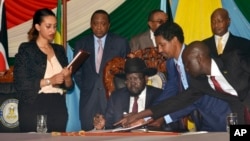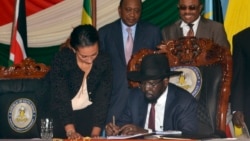Only days after President Salva Kiir of South Sudan signed a peace agreement seeking to end 20 months of fighting, both government and opposition forces have already violated the ceasefire called for in the agreement.
Credible reports indicate fighting on both sides, especially in Upper Nile and Unity States. The UN Security Council already warned all parties that failure to abide by the ceasefire will result in new sanctions and an arms embargo.
South Sudan’s conflict erupted in December 2013 during a power struggle between Kiir and his former Vice President Reik Machar. Fighting reopened ethnic fault lines between Kiir's Dinka and Machar's Nuer clans. Thousands of people have been killed and more than 2.2 million driven from their homes, as many have fled to neighboring states. Over 4.6 million people face severe food insecurity as a result of the conflict.
The United States welcomed the August 29 ceasefire orders from both Kiir and Machar as a positive step toward full implementation of the peace agreement. The recent fighting, however, belies the sincerity of these leaders’ commitment to peace and places the entire agreement in jeopardy. The United States calls on all parties to end the provocation and hostile engagement, and to focus on sustainable security arrangements at the upcoming security workshop.
Those who stand in the way of peace will face consequences. To this end, the United States will work with Security Council partners to pursue, as needed, sanctions as authorized under UN Security Council Resolution 2206. The United States will continue to stand with those who choose peace and are committed to faithful implementation of the agreement for the benefit of all South Sudan’s people.






